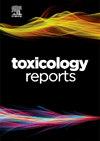Antipsychotic-induced hyperprolactinemia: Toxicologic mechanism and the increased breast cancer risk
Q1 Environmental Science
引用次数: 0
Abstract
Antipsychotic drugs are effective at improving both the positive and negative symptoms of schizophrenia as well as the manic phase of bipolar disorder. Whether an antipsychotic is termed typical or atypical is related to the xenobiotic’s propensity to cause extrapyramidal side effects. However, with a few exceptions, drugs of both classes of antipsychotics are known to cause hyperprolactinemia. As many breast cancers are responsive to prolactin concentrations, the persistent increase in prolactin of the antipsychotics has implications for public health and carcinogenesis. The objective of this study was to review the extant literature on hyperprolactinemia due to antipsychotics, and to determine the risk imposed by those drugs on human breast cancer. A summary risk of breast cancer with use of any antipsychotic was found to be 1.19 (95 % confidence interval 1.10–1.30). When limiting usage of antipsychotics to 5 or more years, the summary risk increased to 1.26 (95 % confidence interval 1.12–1.43). And when limited to those studies who evaluated only those medications with the greatest increase in prolactin, the risk increased to 1.59 (95 % confidence interval 1.37–1.85). Given this increased risk of breast cancer, stronger warnings about this increased risk are warranted, and regular monitoring of prolactin levels and breast cancer screening should be part of the management plan for these patients.
抗精神病药诱导的高泌乳素血症:毒理学机制和乳腺癌风险增加
抗精神病药物对改善精神分裂症的阳性和阴性症状以及双相情感障碍的躁狂期都有效。一种抗精神病药物是否被称为典型或非典型,与该药物引起锥体外系副作用的倾向有关。然而,除了少数例外,已知这两类抗精神病药物都会引起高泌乳素血症。由于许多乳腺癌对催乳素浓度有反应,抗精神病药物催乳素的持续增加对公众健康和致癌有影响。本研究的目的是回顾有关抗精神病药物引起的高泌乳素血症的现有文献,并确定这些药物对人类乳腺癌的风险。使用任何抗精神病药物的乳腺癌总风险为1.19(95 %置信区间1.10-1.30)。当限制使用抗精神病药物5年或更长时间时,总风险增加到1.26(95 %置信区间1.12-1.43)。当仅限于那些只评估催乳素增加最多的药物的研究时,风险增加到1.59(95 %置信区间1.37-1.85)。鉴于乳腺癌风险的增加,对这种风险增加的强烈警告是有必要的,定期监测催乳素水平和乳腺癌筛查应该是这些患者管理计划的一部分。
本文章由计算机程序翻译,如有差异,请以英文原文为准。
求助全文
约1分钟内获得全文
求助全文
来源期刊

Toxicology Reports
Environmental Science-Health, Toxicology and Mutagenesis
CiteScore
7.60
自引率
0.00%
发文量
228
审稿时长
11 weeks
 求助内容:
求助内容: 应助结果提醒方式:
应助结果提醒方式:


